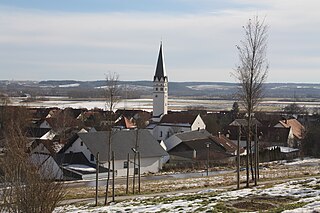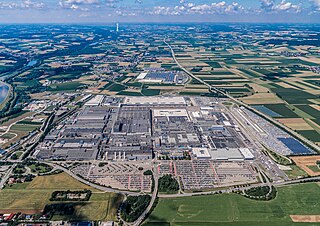Deggendorf is a Landkreis (district) in Bavaria, Germany. It is bordered by the districts of Regen, Freyung-Grafenau, Passau, Rottal-Inn, Dingolfing-Landau and Straubing-Bogen.
Dingolfing-Landau is a Landkreis (district) in Bavaria, Germany. It is bounded by the districts of Straubing-Bogen, Deggendorf, Rottal-Inn and Landshut.

Landshut is a town in Bavaria in the south-east of Germany. Situated on the banks of the River Isar, Landshut is the capital of Lower Bavaria, one of the seven administrative regions of the Free State of Bavaria. It is also the seat of the surrounding district and has a population of more than 75,000. Landshut is the largest city in Lower Bavaria, followed by Passau and Straubing, and Eastern Bavaria's second after Regensburg.
Landshut is a Landkreis (district) in Bavaria, Germany. It is bounded by the districts of Kelheim, Straubing-Bogen, Dingolfing-Landau, Rottal-Inn, Mühldorf, Erding and Freising. The city of Landshut is enclosed by, but does not belong to the district. It is nonetheless its administrative seat.
Straubing-Bogen is a Landkreis (district) in the eastern part of Bavaria, Germany. Neighboring districts are Cham, Regen, Deggendorf, Dingolfing-Landau, Landshut and Regensburg. The independent town of Straubing is surrounded by the district. The seat of the government of the district (Landratsamt) is located in Straubing.

Moosburg an der Isar is a town in the Landkreis Freising of Bavaria, Germany.

Hans Glas GmbH is a former German automotive company, which was based in Dingolfing. Originally a maker of farm machinery, Glas evolved first into a producer of motor scooters, then automobiles. It was purchased by BMW in 1966, mainly to gain access to Glas's patents; they were the first to use a timing belt with an overhead camshaft in an automotive application. Its limited model range was shortly phased out by its new parent.

Landau an der Isar is the second-largest town in the Lower Bavarian district, or Landkreis, of Dingolfing-Landau, in the state of Bavaria, Germany. It lies on the river Isar, 120 km downstream from Munich. In 2020, its population was around 14,000.

Frontenhausen is a municipality in the district of Dingolfing-Landau in Bavaria in Germany. It is the filming location for the 2013 crime film Dampfnudelblues.

Gottfrieding is a municipality in the district of Dingolfing-Landau in Bavaria in Germany.

Loiching is a municipality in the district of Dingolfing-Landau in Bavaria in Germany.

Mamming is a municipality in the district of Dingolfing-Landau in Bavaria in Germany.

Marklkofen is a municipality in the district of Dingolfing-Landau in Bavaria in Germany.

Moosthenning is a municipality in the district of Dingolfing-Landau in Bavaria in Germany.

Niederviehbach is a municipality in the district of Dingolfing-Landau in Bavaria in Germany. It lies on the Isar River.

Pilsting is a municipality in the district of Dingolfing-Landau in Bavaria in Germany.

Wallersdorf is a market town and municipality in the district of Dingolfing-Landau in Bavaria in Germany.

Bayerbach is a municipality in the district of Landshut in Bavaria in Germany.

The Landshut–Plattling railway is a single-tracked, electrified main line in Lower Bavaria, in southern Germany. It runs along the Isar river and is part of the line between Munich and Passau.

The BMW Group Plant Dingolfing is a network of BMW plants in Dingolfing, Dingolfing-Landau, Lower Bavaria, Germany with a total area of around 280 hectares.




















